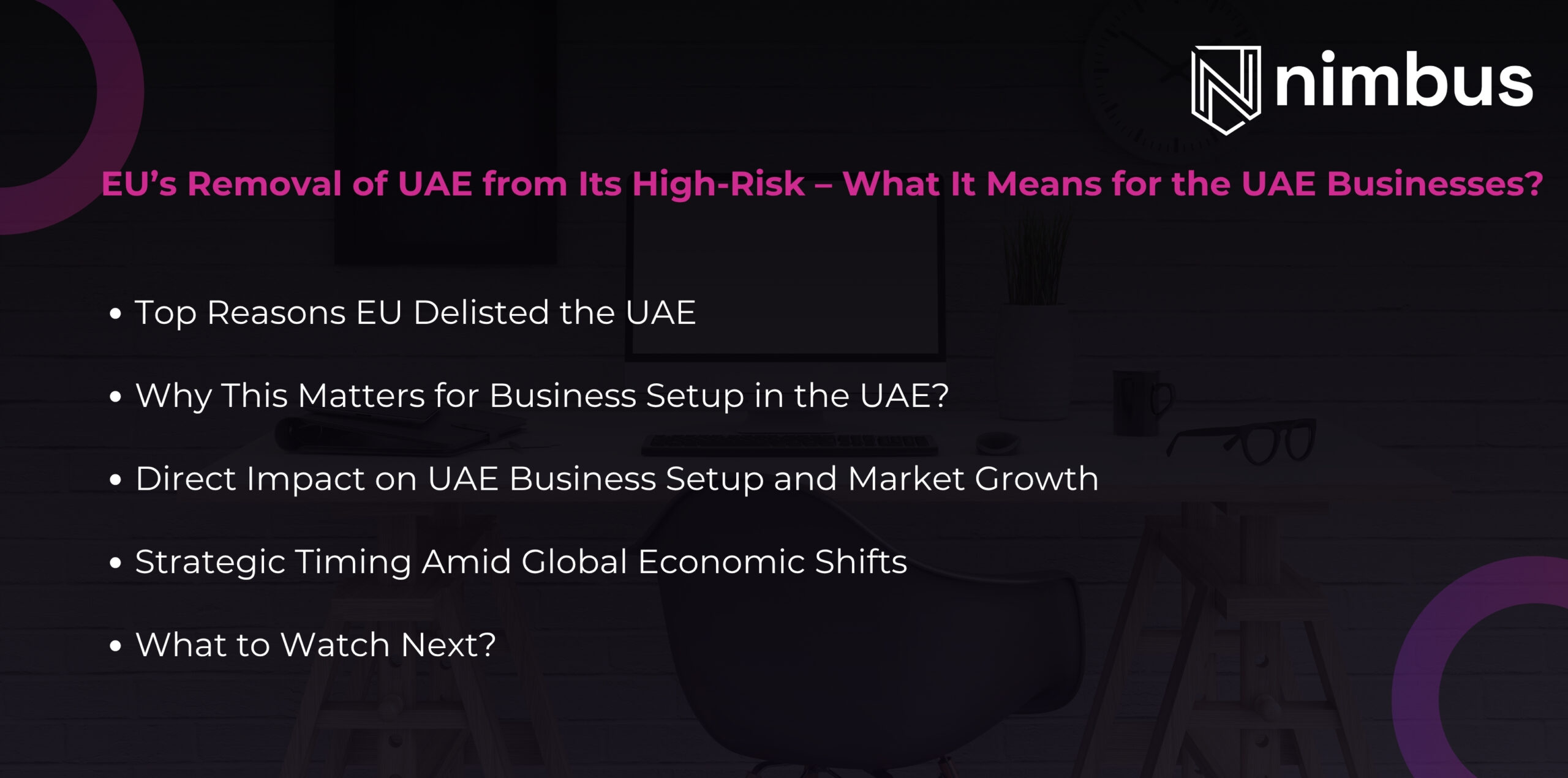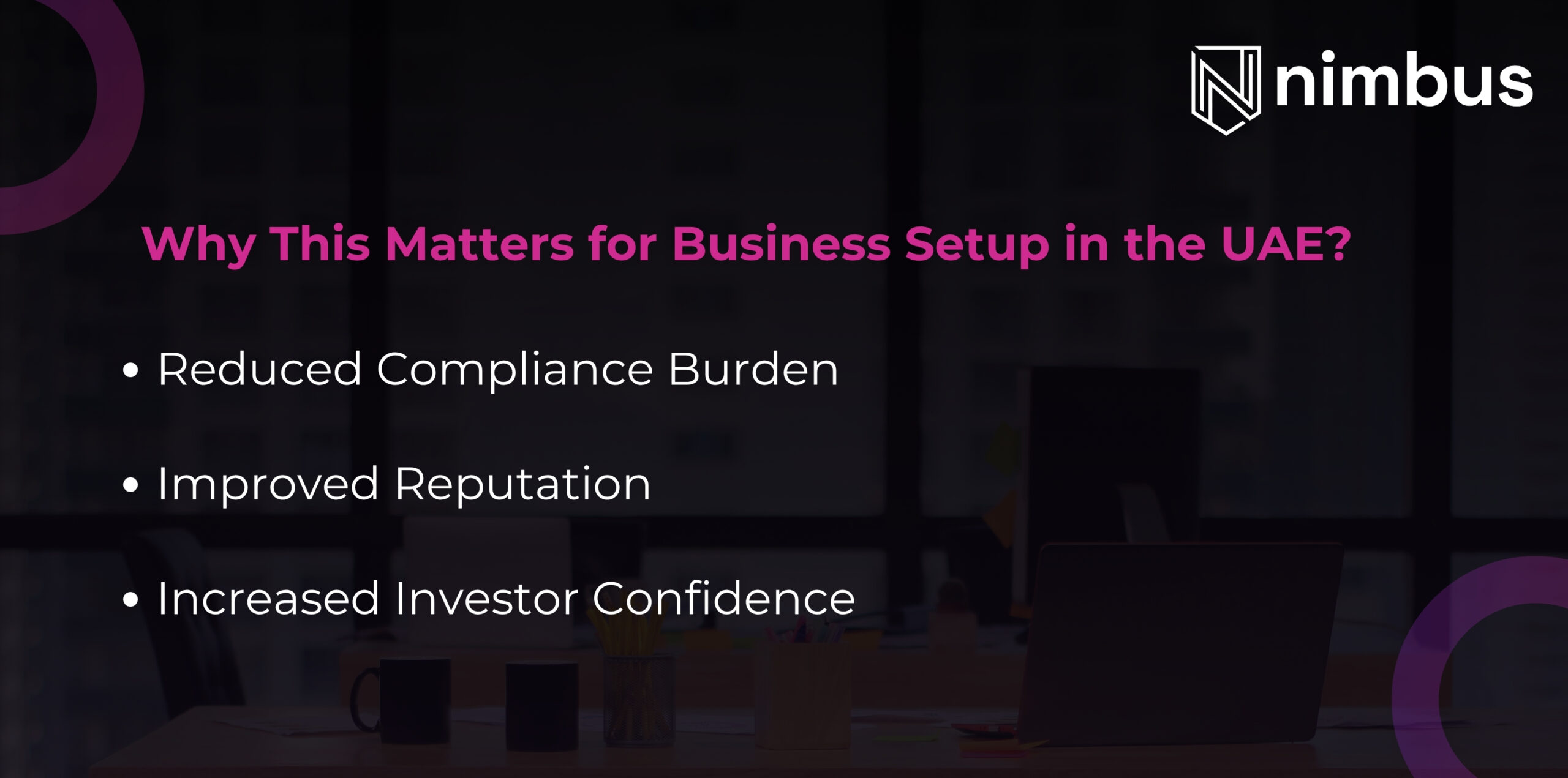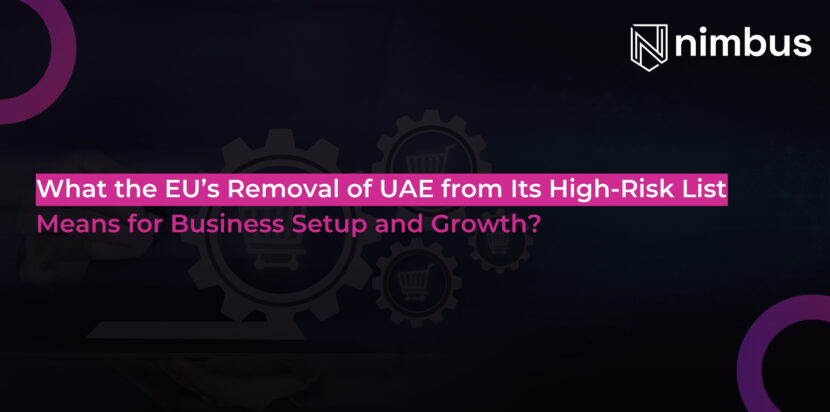In a move that has major implications for investors, financial institutions, and entrepreneurs, the European Union has officially removed the UAE from its list of high-risk third countries for money laundering and terrorist financing.
This decision, made in 2025, signals a significant vote of confidence in the UAE’s regulatory environment, particularly in its efforts to align with global anti-money laundering (AML) and counter-terrorist financing (CFT) standards.
For those considering business setup in the UAE, this development could not have come at a better time. The country has worked tirelessly to upgrade its financial compliance frameworks, and this recognition by the EU marks a turning point for its international credibility.
Here’s a closer look at the key takeaways and what they mean for UAE business setup and long-term market growth.
EU’s Removal of UAE from Its High-Risk – What It Means for the UAE Businesses?

1. Top Reasons EU Delisted the UAE
The EU’s decision came after the UAE demonstrated substantial progress in financial oversight. This was made possible by the UAE government following its enactment of a broad series of reforms which included:
- Over AED 339 million (approximately US$92 million) in fines issued to non-compliant financial entities.
- Enhanced regulation in sectors considered high-risk, such as real estate, gold and jewellery trading, auditing, and virtual assets.
- Legislative updates, including amendments to Federal Decree Law No. (20) of 2018, and the implementation of Cabinet Decisions focused on beneficial ownership and financial crime prevention.
- Mandating compliance programs for Designated Non-Financial Businesses and Professions (DNFBPs), including lawyers, real estate agents, and precious metal traders.
2. Why This Matters for Business Setup in the UAE?
For entrepreneurs and international investors, particularly those considering business setup in Dubai or other emirates, the EU’s decision offers immediate and tangible benefits:

– Reduced Compliance Burden:
Being on the EU’s high-risk list meant stricter due diligence processes, slower financial transactions, and more red tape for UAE-based entities. With the UAE now delisted, financial institutions in Europe and other jurisdictions can engage with UAE businesses without the additional layers of scrutiny.
– Improved Reputation:
For many international businesses, perception is everything. This move sends a strong message that the UAE is a safe, stable, and transparent place to do business.
– Increased Investor Confidence:
One of the biggest barriers to foreign investment is regulatory uncertainty. The EU’s recognition of the UAE’s AML/CFT reforms significantly boosts investor trust, particularly among European stakeholders who have previously held back due to compliance risks.
3. Direct Impact on UAE Business Setup and Market Growth
For those offering business setup services or assisting clients with UAE business setup, the opportunities are expanding.
– Boost for Free Zones and Mainland Companies:
Whether setting up in a free zone or setting up a mainland company, businesses can now operate with greater assurance that international transactions will face fewer obstacles, smoothening cross-border operations.
– Enhanced Cross-Border Trade:
The removal aligns closely with the launch of EU-UAE FTA negotiations. With over €94 billion in trade and investment already flowing between the two regions, the FTA aims to further reduce tariffs and encourage mutual investments in sectors such as healthcare, fintech, AI and green hydrogen.
4. Strategic Timing Amid Global Economic Shifts
The timing of the EU’s announcement is far from accidental. Firstly, this convergence of financial reform and diplomatic outreach illustrates the UAE’s broader ambition of becoming a global hub for investments, backed by regulatory integrity. It coincides with deepening EU-UAE ties, including:
- The launch of the first bilateral FTA between the EU and a Gulf nation, officially initiated on May 28, 2025.
- Rising trade volumes, with goods trade reaching €55 billion and services trade around €39 billion.
- The UAE being the EU’s largest investment partner in the Gulf, with EU investments totaling €186 billion.
5. What to Watch Next?
The EU’s removal of the UAE from its high-risk money laundering list is a strong signal of the country’s evolution into a transparent and investor-friendly economy. Businesses should keep an eye on:
Ready to enter the UAE market?
For foreign entrepreneurs and local business consultants, this means clearer skies and stronger momentum for business setup in the UAE. From reduced financial friction to greater investor trust, the implications are significant.
Companies offering business setup services in the UAE will likely see increased demand, particularly from European entrepreneurs who were previously cautious.
This is an ideal time for service providers to streamline offerings around compliance support, bank account facilitation, and cross-border consulting. For those ready to enter this fast-evolving market, partnering with experienced business setup service providers can ensure a smooth and strategic launch.


